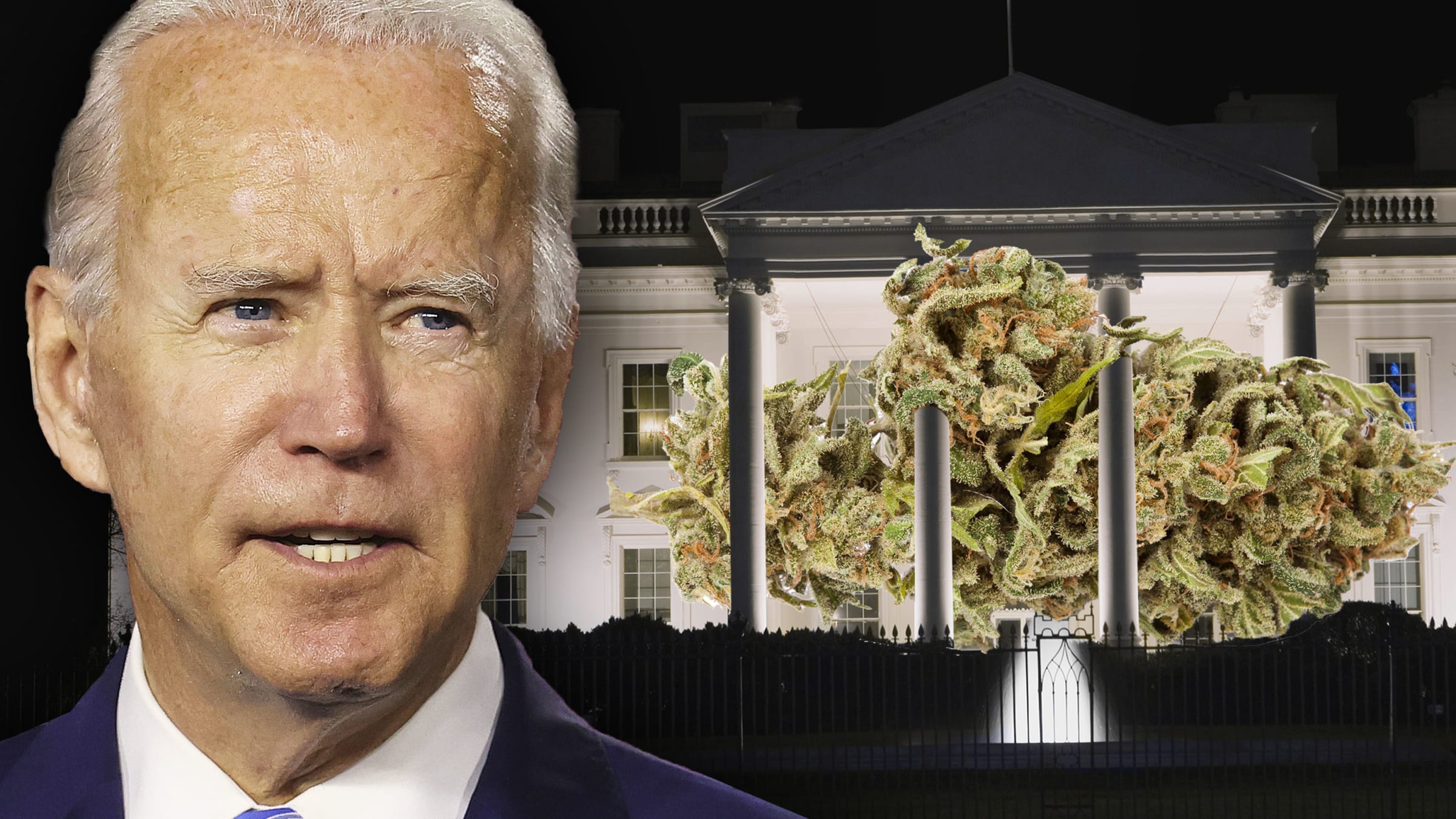Biden White House Sandbags Staffers, Sidelines Dozens for Pot Use

Photo Illustration by Sarah Rogers/The Daily Beast/ Photos Getty
Several staffers were informally told by transition officials that some past marijuana use would be overlooked, only to be told later that they were being asked to resign.
Dozens of young White House staffers have been suspended, asked to resign, or placed in a remote work program due to past marijuana use, frustrating staffers who were pleased by initial indications from the Biden administration that recreational use of cannabis would not be immediately disqualifying for would-be personnel, according to three people familiar with the situation.
The policy has even affected staffers whose marijuana use was exclusive to one of the 14 states—and the District of Columbia—where cannabis is legal. Sources familiar with the matter also said a number of young staffers were either put on probation or canned because they revealed past marijuana use in an official document they filled out as part of the lengthy background check for a position in the Biden White House.
In some cases, staffers were informally told by transition higher-ups ahead of formally joining the administration that they would likely overlook some past marijuana use, only to be asked later to resign.
“There were one-on-one calls with individual affected staffers—rather, ex-staffers,” one former White House staffer affected by the policy told The Daily Beast. “I was asked to resign.”
“Nothing was ever explained” on the calls, they added, which were led by White House Director of Management and Administration Anne Filipic. “The policies were never explained, the threshold for what was excusable and what was inexcusable was never explained.”
In response to this news story, White House press secretary Jen Psaki tweeted out on Friday an NBC News report from February stating that the Biden administration wouldn’t automatically disqualify applicants if they admitted to past marijuana use. Psaki said of the hundreds of people hired in the administration, only five who had started working at the White House are “no longer employed as a result of this policy.”
Psaki didn’t note how many had been disqualified for a White House job before actually starting, nor did she note how many were suspended or relegated to remote work, but she did send an additional statement to The Daily Beast on Friday.
“In an effort to ensure that more people have an opportunity to serve the public, we worked in coordination with the security service to ensure that more people have the opportunity to serve than would not have in the past with the same level of recent drug use. While we will not get into individual cases, there were additional factors at play in many instances for the small number of individuals who were terminated,” Psaki said.
The White House said in February it intended—for some candidates—to waive the requirement that all potential appointees in the Executive Office of the President be able to obtain a “top secret” clearance. The rules about past marijuana use and eligibility for the clearance vary, depending on the agency: For the FBI, an applicant can’t have used marijuana in the past three years; at the NSA, it’s only one. The White House, however, largely calls its own shots, and officials at the time told NBC News that as long as past use was “limited” and the candidate wasn’t pursuing a position that required a security clearance, past use may be excused.
Asked about the policy and its effect on the administration’s staffing Thursday night, a White House spokesperson disputed the number of affected staff, but said the Biden administration is “committed to bringing the best people into government—especially the young people whose commitment to public service can deepen in these positions,” and noted that the White House’s approach to past marijuana use is much more flexible than previous administrations.
“The White House’s policy will maintain the absolute highest standards for service in government that the president expects from his administration, while acknowledging the reality that state and local marijuana laws have changed significantly across the country in recent years,” the spokesperson added. “This decision was made following intensive consultation with career security officials and will effectively protect our national security while modernizing policies to ensure that talented and otherwise well-qualified applicants with limited marijuana use will not be barred from serving the American people.”
A candidate’s personal drug history, barring past convictions for possession, is largely based on the honor system, as well as supplemental interviews with family and friends by the FBI—although lying on the 136-page SF-86 form is a felony, and effectively bars a candidate from ever working for a federal agency. Over the years, some rules have been relaxed or altogether eliminated (the existence of nude photos of a candidate are no longer automatically disqualifying, for example).
Some of these dismissals, probations and remote work appointments could have potentially been a result of inconsistencies that came up during the background-check process, where a staffer could have, for example, misstated the last time they used marijuana. The effect of the policy, however, would be the same: The Biden White House would be punishing various staffers for violating thresholds of past cannabis use that would-be staffers didn’t know about.
Previous drug use can pose problems for obtaining a security clearance. While practices across the federal government vary, in general agencies may consider the type, frequency, and recency of drug use as mitigating factors when granting a clearance.
The Biden administration has attempted to modernize the White House’s personnel policy as it relates to past marijuana use, which has disproportionately affected younger appointees and those from states where marijuana has been decriminalized or legalized. (Marijuana, of course, remains illegal in the eyes of the federal government.) The number of allowable instances of past marijuana use was increased from the Trump and Obama administrations—a reflection of the drug’s widespread use—and the White House approved limited exemptions for candidates whose positions don’t require security clearances. Those employees, like all those at the White House, must commit to not using marijuana while serving in the federal government and must submit to random drug testing.
The president, however, remains the final authority on who can receive a clearance, and the chief executive can overrule agency judgments on eligibility, as President Donald Trump did when he granted his son-in-law Jared Kushner a top-secret clearance over the objections of the intelligence community and his own counsel.
“I find it absurd that, in 2021, marijuana use is still part of a security clearance background check,” Tommy Vietor, a veteran of the 2008 Obama team who subsequently worked as a National Security Council spokesperson, said Thursday. “To me, marijuana use is completely irrelevant when you’re trying to decide whether an individual should be trusted with national security information.”
In past administrations, White House staff have also had their applications denied, or the jobs they’d started abruptly yanked, because of marijuana use. In the earliest days of the Trump era, multiple people—some mid-tier, some more senior-level—had jobs they had already accepted pulled by White House brass after flunking urine tests that showed signs of recent marijuana use, according to a person with knowledge of the matter.
The marijuana policy has tripped up the appointments of even senior White House officials in past administrations. Ben Rhodes, a former deputy national security adviser in the Obama White House, wrote in his memoir that his interim security clearance was initially denied because of past marijuana use. Alyssa Mastromonaco, who served as deputy chief of staff for operations in the Obama administration and has a self-described “love of the ganj,” wrote in Vice in 2017 that, after filling out her SF-86, she “went home and flushed all the pot I had stashed in my underwear drawer.”
In the end, Mastromonaco was allowed to join the administration, she wrote, “but I was randomly drug-tested pretty much once a month for the first year, and regularly after that.”
But would-be staffers in the Biden administration whose dream jobs were derailed by an opaque system now feel their own truthfulness has been used against them.
“It’s exclusively targeting younger staff and staff who came from states where it was legal,” the former staffer said.
Updated: 11:30 a.m. Friday with White House press secretary Jen Psaki’s response.


